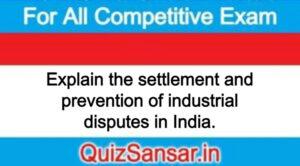
Explain the settlement and prevention of industrial disputes in India.
Explain the settlement and prevention of industrial disputes in India.
Ans.
The Industrial Disputes Act 1947, provides a legalistic way of setting disputes, where the employer and the unions fails to reach an agreement bilaterally. The provisions of this judicial machinery may be listed-
1. Conciliation: Conciliation is a process by which representatives of workers and employers are brought together before a third person or a group of persons with a view to persuade them to come to a mutually satisfying agreement. The objective of this method is to settle disputes quickly and prevent prolonged work stoppages if they have already occurred.
2. Conciliation officer: The central and state governments can appoint a conciliation officer to mediate in all disputes brought to his notice. The officer enjoys the powers of a civil court. He can call and witness disputing parties on both and interpret the facts of the case. He is expected to give judgement within 14 days of the commencement of the conciliation proceedings. His judgement is binding on all the parties to the dispute. The conciliation officer has a lot of discreation over the ways and means to be followed to bring about a settlement between the disputants. He may do all such things as he thinks fit for the purpose of inducing the parties to come to a fair and amicable settlement of disputes.
3. Board of Conciliation: When the conciliation officer fails to resolve the disputes between the parties, the government can appoint a Board of conciliation officer. It is an advoc, body having the powers of a civil court, created for a specific dispute. It consists of a chairman and two or four other members nominated in equal numbers by the parties to the dispute. The chairman who is appointed by government should not be connected with the dispute or with any industry directly affected by such dispute. The board conducts conciliation proceedings in the same way a conducted by a conciliation officer. In actual practice settling disputes through a conciliation officer was found to be more flexible when compared to the board of conciliation.
4. Court of Enquiry: In case of conciliation proceedings fail to resolve a dispute a court of enquiry is constituted by the government to investigate the dispute and submit the report within 6 months. It is merely a fact finding body and its findings are not binding on the parties to the dispute.
5. Voluntary Arbitration: When conciliation proceedings fail to settle the dispute, the conciliation officer may persuade the conflicting parties to voluntarily refer the dispute to a third party known as Arbitrator, appointed by the parties themselves. The arbitrator listens to the view points of both parties and delivers an judgment on the dispute. He does not have any judicial powers. The arbitrator submits this judgement on the dispute to the government. There after the government publishes the award within 30 days of its submission. The judgement becomes enforceable after 30 days of its publication. The arbitration award/ judgement is binding on all the parties to the agreement and all other parties summoned to appear in the proceedings as parties to dispute. Before delivering the judgment, the arbitrator is expected to follow due procedure of giving notice to parties, giving a fair hearing, relying upon all available evidence and records and follow the principles of natural justice.
6. Labor Court: The labor court consists of one independent person called as presiding officer who has been judge of High Court or a district judge or additional district judge for not less than 3 years has held any judicial office in India for not less then 7 years.
7. Industrial Tribunal: Industrial Tribunal appoint by the Government. It has a wider jurisdiction then the labor court. The Government concerned may appoint two assessors to advice the presiding officer in the proceedings. An industrial tribunal can adjudicate on the following matters (i) Wages including the period and mode of payment. (ii) Compensatory and other allowances, (iii) Hours of work and rest periods (iv) Leave with wages and holidays (v) Bonus, profit sharing, provident fund and gratuity (vi) Shift working otherwise than in accordance with the standing orders (vii) Classification by grades (viii) Rules of discipline (ix) Retrenchment and closure of establishment (x) Any other matters that may be prescribed.
8. National Tribunal: This is one man adjudicatory body to be appointed by the central government to deal with disputes of national importance which are likely to affect the industrial establishments in more than one state.






